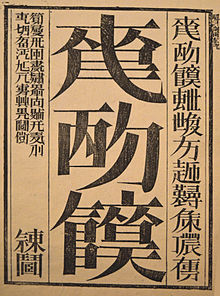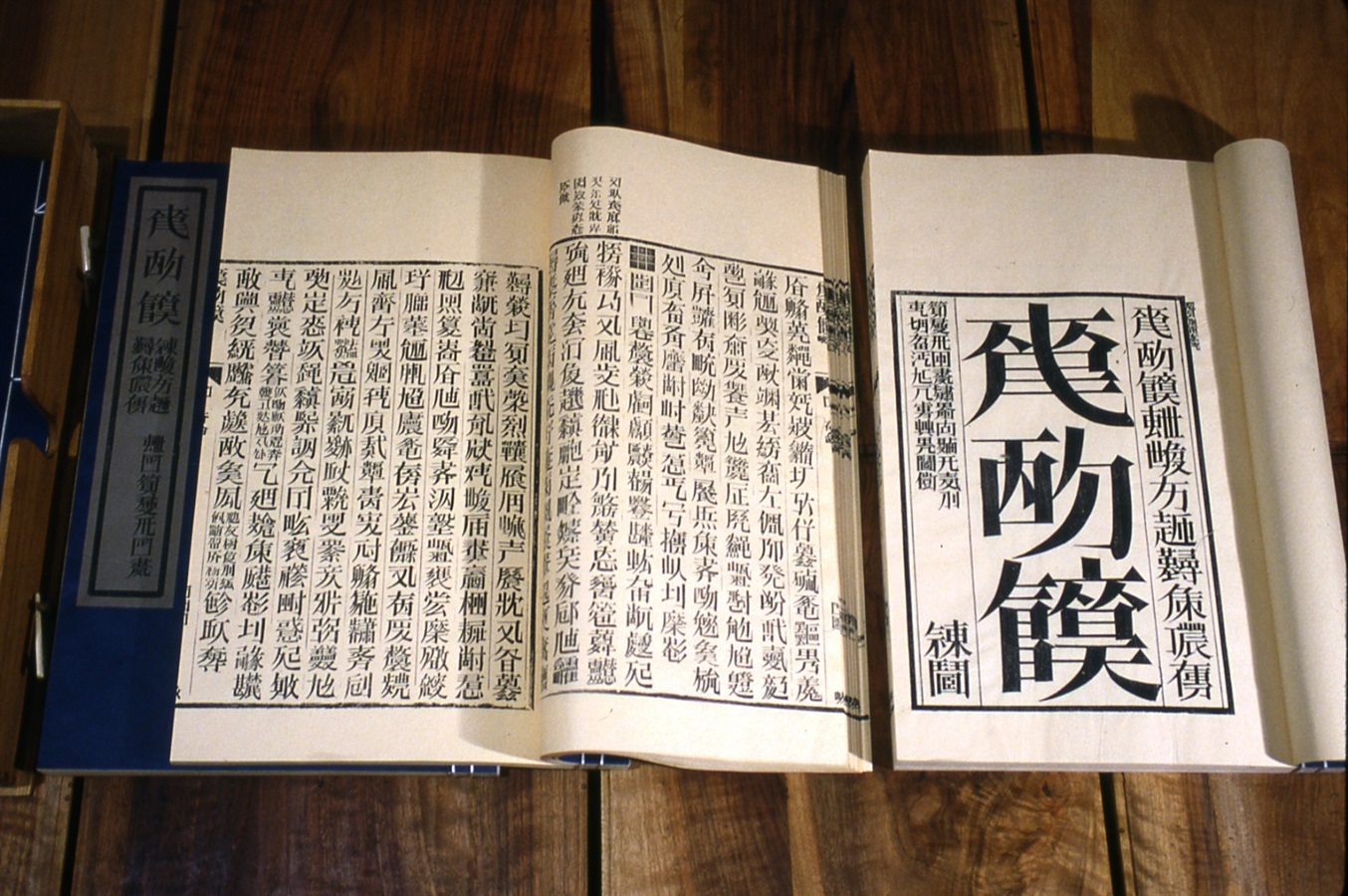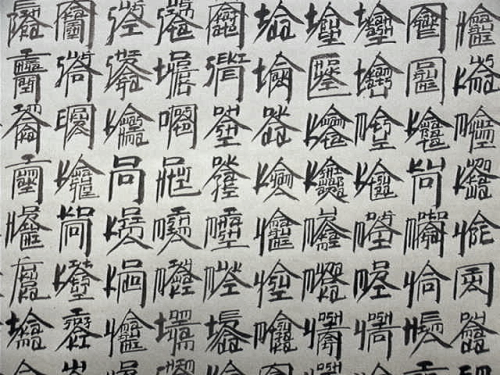It looks like you're using an Ad Blocker.
Please white-list or disable AboveTopSecret.com in your ad-blocking tool.
Thank you.
Some features of ATS will be disabled while you continue to use an ad-blocker.
5
share:
A Book from the Sky (simplified Chinese: 天书; traditional Chinese: 天書; pinyin: Tiānshū) is the title of a book produced by Chinese artist Xu Bing in the style of fine editions from the Song and Ming dynasties, but filled entirely with meaningless glyphs designed to resemble traditional Chinese characters.
Source:
en.m.wikipedia.org...
Title page below. These "Chinese characters" are meaningless and are designed just to look like Chinese characters.

A few pages of the text:

This work took more than four years from construction to completion. Xu Bing created more than 4,000 "pseudo Chinese characters"...These thousands of "characters" look exactly like real Chinese characters, but they are actually "pseudo Chinese characters" made by artists. They are arranged and printed by more than 4,000 movable type plates hand-carved by artists. The extremely sophisticated production process makes it hard for people to believe that these exquisite "classics" can't read anything. Both attract and block people's desire to read.
Xu Bing once mentioned that these fake words "seem to make intellectuals uncomfortable", forcing people to doubt the existing knowledge system. Many people wanted to find out even one or two real words during the exhibition.
Source:
www.xubing.com...
a reply to: Never Despise
I'm not following? Why would fake words cause people to doubt existing knowledge system?
Xu Bing once mentioned that these fake words "seem to make intellectuals uncomfortable", forcing people to doubt the existing knowledge system.
I'm not following? Why would fake words cause people to doubt existing knowledge system?
a reply to: new_here
Not being a Chinese intellectual either I also find it a perplexing comment.
Perhaps if you stare at Chinese characters all day for your whole life, you develop an intimacy and emotional attachment to them that is subverted by a system that appears similar yet is eeriely drained of all meaning...
Not being a Chinese intellectual either I also find it a perplexing comment.
Perhaps if you stare at Chinese characters all day for your whole life, you develop an intimacy and emotional attachment to them that is subverted by a system that appears similar yet is eeriely drained of all meaning...
a reply to: Never Despise
I don't know much about chinese, but it may have to do with the way their writing and language works. Chinese characters tend to represent a whole word or idea and the language itself is very visual.
A few years ago when I was working at a stone shop, I asked one of my coworkers who spoke chinese why they used the English word island when referring to a kitchen island.
He wasn't even even sure how to explain it, but the gist of it is there's no chinese words that fit the concept of a kitchen island. The word for island translates directly to something like piece of land floating on the water. There's some concepts that just can't translate.
He tried to explain too how google translate rarely translated English into chinese characters correctly. In some cases the characters would be correct, but they way they were arranged made it nonsense. Or the characters chosen, while technically correct, were not actually the correct characters to translate it properly and still produced a nonsense sentence just because of the way the language works.
I'm not sure anything similar to that book could be produced in English and still have the same effect. English words just don't work the same way as chinese characters.
I don't know much about chinese, but it may have to do with the way their writing and language works. Chinese characters tend to represent a whole word or idea and the language itself is very visual.
A few years ago when I was working at a stone shop, I asked one of my coworkers who spoke chinese why they used the English word island when referring to a kitchen island.
He wasn't even even sure how to explain it, but the gist of it is there's no chinese words that fit the concept of a kitchen island. The word for island translates directly to something like piece of land floating on the water. There's some concepts that just can't translate.
He tried to explain too how google translate rarely translated English into chinese characters correctly. In some cases the characters would be correct, but they way they were arranged made it nonsense. Or the characters chosen, while technically correct, were not actually the correct characters to translate it properly and still produced a nonsense sentence just because of the way the language works.
I'm not sure anything similar to that book could be produced in English and still have the same effect. English words just don't work the same way as chinese characters.
edit on 9/11/2020 by dug88 because: (no reason given)
a reply to: dug88
It's similar to Japanese and a few other languages where words are Anglican based. It's called gairaigo or wasei-eigo
Like aisu-kyandi which is literally ice and candy which is the word for popsicle.
Or, ame-futo which is american football.
Or, baikingu which is viking.
Or, bata which is butter.
Or, terefon which is telephone.
Some of the phrases are hilarious. The phrase "bakodo hito" for a guy with a combover literally translates into "barcode man."
It's similar to Japanese and a few other languages where words are Anglican based. It's called gairaigo or wasei-eigo
Like aisu-kyandi which is literally ice and candy which is the word for popsicle.
Or, ame-futo which is american football.
Or, baikingu which is viking.
Or, bata which is butter.
Or, terefon which is telephone.
Some of the phrases are hilarious. The phrase "bakodo hito" for a guy with a combover literally translates into "barcode man."
new topics
-
Outgoing President BARACK OBAMA - Secret Cryptic Call to the News Media on 1.17.2016.
Dissecting Disinformation: 1 hours ago -
Austin sends Fighter Squadrons, Tanker Aircraft to the Middle East
World War Three: 9 hours ago -
Diddy's ex Jennifer Lopez urges Americans to trust her about Kamala Harris
Jokes, Puns, & Pranks: 9 hours ago -
Concerning data with regards to Turbo Cancer
Diseases and Pandemics: 10 hours ago -
Trump thinks Liz Cheaney should be shot in the face?
US Political Madness: 11 hours ago
top topics
-
CNN now has a pay wall
Other Current Events: 15 hours ago, 14 flags -
Pentagon announces new military aid package for Ukraine
World War Three: 15 hours ago, 14 flags -
Trump thinks Liz Cheaney should be shot in the face?
US Political Madness: 11 hours ago, 14 flags -
Concerning data with regards to Turbo Cancer
Diseases and Pandemics: 10 hours ago, 10 flags -
Tucker Carlson Shares Amazing Story: "I Was Mauled By a Demon"
Paranormal Studies: 16 hours ago, 8 flags -
Diddy's ex Jennifer Lopez urges Americans to trust her about Kamala Harris
Jokes, Puns, & Pranks: 9 hours ago, 8 flags -
Austin sends Fighter Squadrons, Tanker Aircraft to the Middle East
World War Three: 9 hours ago, 6 flags -
Outgoing President BARACK OBAMA - Secret Cryptic Call to the News Media on 1.17.2016.
Dissecting Disinformation: 1 hours ago, 1 flags
active topics
-
Tucker Carlson Shares Amazing Story: "I Was Mauled By a Demon"
Paranormal Studies • 36 • : Astrocometus -
Betting markets have Trump by a good bit
2024 Elections • 91 • : UKTruth -
Trump thinks Liz Cheaney should be shot in the face?
US Political Madness • 64 • : JadedGhost -
Concerning data with regards to Turbo Cancer
Diseases and Pandemics • 14 • : tarantulabite1 -
Outgoing President BARACK OBAMA - Secret Cryptic Call to the News Media on 1.17.2016.
Dissecting Disinformation • 0 • : WeMustCare -
Chinese citizen charged after allegedly voting illegally in key battleground state;
2024 Elections • 27 • : confuzedcitizen -
Innocent until proven guilty.
Rant • 6 • : confuzedcitizen -
Resources for Tracking EARLY VOTES As They Are Cast Nationwide - 2024 Presidential Election.
2024 Elections • 37 • : WeMustCare -
CNN now has a pay wall
Other Current Events • 29 • : confuzedcitizen -
President BIDEN Approved Omitting from the Transcript That He Called Trump Supporters GARBAGE.
2024 Elections • 25 • : WeMustCare
5

